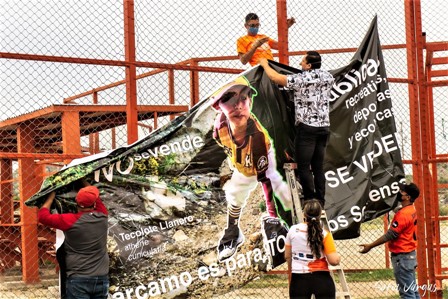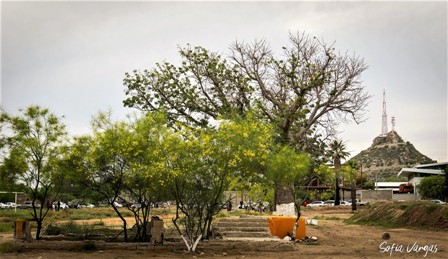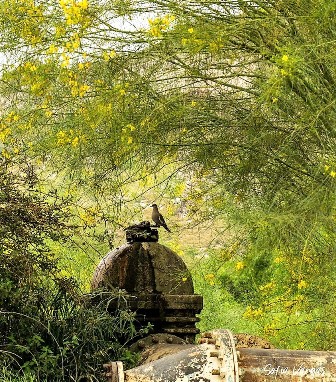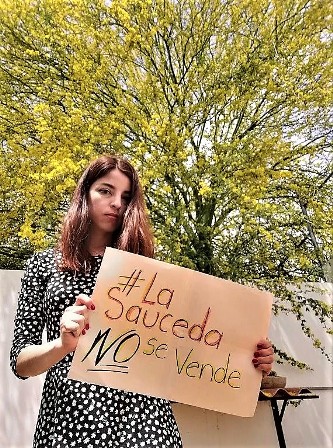Politicians diss Hermosillo Biological Corridor plan

Event organizers see in the pandemic one more reason for their fight to reintegrate green spaces and water into the public sphere in a desert city where they are sorely lacking. Click to enlarge.
HERMOSILLO
March 21, 2020—the beginning of spring and International Forest Day—marked the indefinite postponement of scheduled activities by the citizens collective behind the proposed Hermosillo Biological Corridor.
The postponement was necessary to comply with restrictions imposed by health authorities to protect residents in response to the Covid-19 outbreak. Event organizers saw in the pandemic yet one more reason for their struggle to reintegrate into the public sphere water and green spaces that are so scarce in this desert city.
The leaders of the initiative stated:
“Razing forests just to line pockets opens the door to increased risks for disease spread. The incursion of humans into nature becomes a boomerang that rebounds on global health. According to initial reports, the expansion of Covid-19 is due to the process of zoonosis that, far from having its origin in the exotic species markets, instead begins with deforestation and infrastructure projects in forested territories. This is the first step for animals practically unknown to humans to move closer to us.
An estimated 1.7 million as of yet undiscovered viruses are hidden in the remotest areas of the planet, revealing the extent to which altering natural spaces at the whim of the economy—be it deforestation or trafficking in exotic species—can increase risks of a pandemic like the current one.
Hermosillo is an example of a failed model and we need another one. Sustainability based on the economy and not on nature is not sustainability; it is simply the way to justify the alteration of habitat on behalf of companies that will make it profitable for business, not for the restoration of the habitat to its natural state.

There are more than 100 native Palo Verde trees (Parkinsonia aculeata). Mesquite and Vinorama add to the 250 total trees in the 10 hectares for sale. Click to enlarge.
Humans can no longer continue destroying our wetlands, displacing water, polluting the air, erecting more buildings, and thinking only of the typical economic incentives for attracting money and investment.
“Finally, in light of the Covid-19 pandemic, we know that there are certain risk factors such as high blood pressure, diabetes, and obesity. One way to prevent or cure these conditions is to be physically active. Not everyone can afford a gym, so public green spaces like those that politicians now intend to auction off are essential for health,” they added.
The pronouncement corresponds to the most recent wave of resistance against the privatization of public parks and recreational areas in Hermosillo, a city with a population of almost 1 million.
In May 2019 teachers from the University of Sonora, environmentalists and representatives of civil society against privatization began to organize weekly to design the Hermosillo Biological Corridor. The citizens project aims to protect free access to the natural heritage of the city and make it "more livable", they said.

Birds, small mammals and other wildlife, as well as baseball and football teams, enjoy El Cárcamo. Click to enlarge.
By September, architects had a master plan, in which they hoped to have volunteers plant up to 60,000 trees in parks and sidewalks. The plan was widely accepted when they presented it in a forum at the University of Sonora (Unison). It contrasted greatly with a proposed project in the city center to cover streets with plastic or banners shaped like flowers.
Joel Montoya Haro, Unison professor and corridor proponent, explained the reason for having a route that would link several kilometers of green areas extending from the university to Los Naranjos, then from there to old La Sauceda Recreational Park, and finally continuing on to connect government areas, the city center, outlying neighborhoods and the new Río Sonora Ecopark.
They announced that October 26 would be the symbolic launch date of the project. However, two days later the Governor’s office published a decree in the Official Gazette, forming a trust to dismember La Sauceda Recreational Park.
In addition to Gov. Claudia Artemis Pavlovich Arellano's proposal to privatize a state-owned property portion, Hermosillo Mayor Célida Teresa López Cárdenas plans to sell a municipal sports area located a block away. The city council already has authorized the auction.
An important wetland ecosystem–the oasis that gave birth to Hermosillo—is on the chopping block because construction land sales are a well-documented way that Sonoran politicians award their faithful supporters.

They uploaded their petition "La Sauceda no se vende" (La Sauceda is not for sale) to Change.org, and by May 2 had garnered more than 34,000 signatures. Click to enlarge.
"That they continue to repeat what previous governments have done is the final straw," remarks Blanca Coto, another proponent of the corridor.
The collective presented the design to the state legislature in mid-March and later met with the mayor.
Despite her solidarity with Mujeres Unidas Morena, the party movement that brought the current municipal government to power—López Cárdenas insisted on auctioning off a section of the La Sauceda estate known as El Cárcamo.
The rushed sale of the 25 acre site was authorized without prior public consultation during a closed-door session of the city council on March 28.
Council members argued that the money from the sale was needed to finance pothole repair in parking areas and on city streets, as well as for the coronavirus response.
The park’s proponents lost little time, heading outside to set up protest tents on the street.
"It is very worrying that in the face of institutional harassment and in the midst of a deadly situation, the Célida López government is so insensitive to the citizen's request to stop an unusually hasty and clearly rigged auction," Montoya said.
They uploaded their petition "La Sauceda no se vende" (La Sauceda is not for sale) to Change.org, and by May 2 had garnered more than 34,000 signatures.
Meanwhile, from within the ranks of at least 50 citizens groups in Hermosillo, tree planting in parks across the city can best be described as an outbreak in itself.
